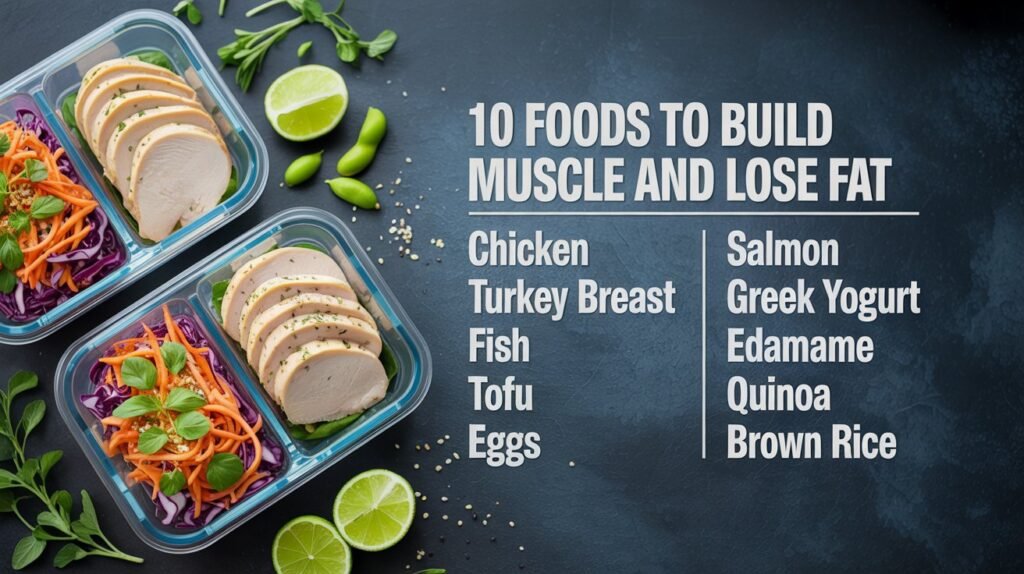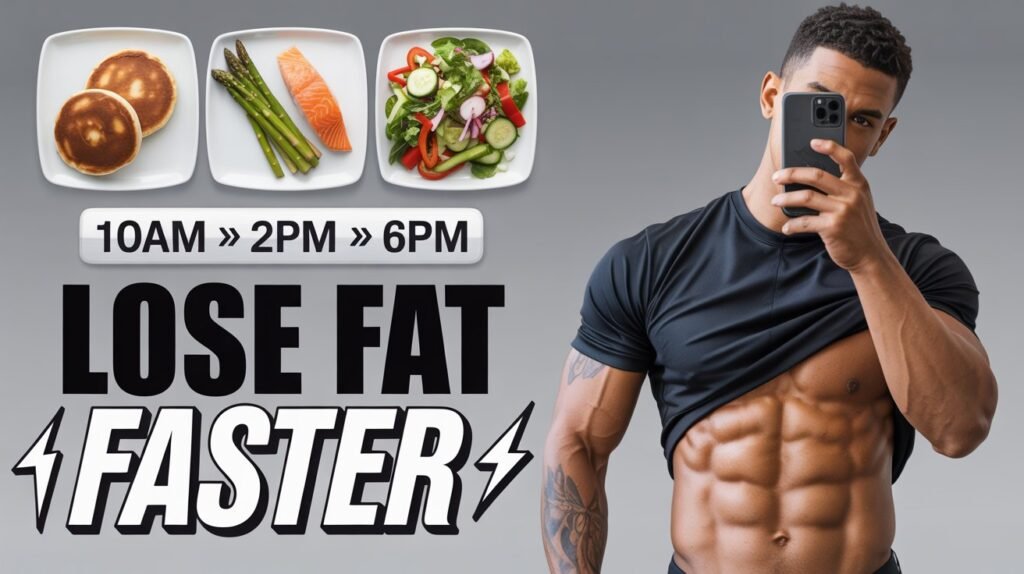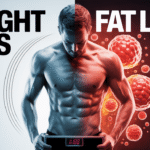Building muscle and losing fat requires a balanced diet. It’s crucial to fuel your body with the right nutrients.
Finding the best diet to achieve these goals might seem overwhelming. With so many options and advice, it’s hard to know where to start. But worry not, this guide is here to simplify things for you. Understanding how food affects muscle growth and fat loss is essential.
By focusing on nutrient-rich foods, you can make progress without feeling deprived. This diet strategy aims to help you gain muscle and shed unwanted fat efficiently. Ready to discover how the right diet can transform your fitness journey? Let’s dive in and explore the best dietary choices for building muscle and losing fat.
Macronutrients
Protein helps build muscle. It repairs muscle tissue. Muscles need protein to grow. Eating enough protein is key. Aim for lean sources. Chicken and fish are good options. Eggs and beans work too. Protein shakes help if needed. Spreading intake through the day is best.
Carbs give energy. Choose whole grains. Brown rice is better. Oats are good too. Fruits and vegetables are important. Fats also play a role. Good fats come from nuts. Avocados are healthy. Olive oil is good. Avoid junk food fats. Balance is key for both carbs and fats.
Meal Timing
Eating before a workout can be important. Choose foods with carbs and protein. Carbs give you energy. Protein helps build muscle. A banana with peanut butter is a good choice. Try eating 30 minutes before you start.
After a workout, your body needs to recover. Eat a meal with protein and carbs. Protein helps repair muscles. Carbs help replenish energy. Chocolate milk is a great option. Try to eat within an hour after your workout.
Food Choices
Lean proteins are key for muscle growth. Chicken, turkey, and fish are great options. These foods are low in fat. Eggs and lean beef are also good choices. They help repair and build muscles.
Healthy carbs fuel your workouts. Oats, brown rice, and quinoa provide energy. These carbs are rich in fiber. Sweet potatoes and whole grain bread are also good. They keep you full longer.
Fats are important for overall health. Avocados are a great source. Nuts and seeds provide good fats too. Olive oil and fatty fish like salmon are excellent. They help with muscle recovery.

Supplements
Protein powders help build muscle. They are easy to mix with water or milk. Whey protein is popular and works fast. Casein protein works slow and helps at night. Both are good for muscle growth.
Creatine boosts energy during workouts. It helps you lift more weight. You can take it before or after exercise. Creatine is safe and effective. It also helps muscles recover faster.
BCAAs are amino acids. They help prevent muscle loss. They also reduce muscle soreness. You can drink BCAAs during your workout. They are helpful for long and intense exercises.
Hydration
Drinking enough water helps build muscles. It keeps your body hydrated. Muscles need water to recover and grow. Aim for at least 8 cups a day. Drink more if you exercise.
Electrolytes keep you hydrated. They help muscles work well. Important electrolytes include sodium, potassium, and magnesium. You can get these from foods like bananas, nuts, and leafy greens. Sometimes, sports drinks can help too.

Training Considerations
Strength training is key to building muscle. Lifting weights helps your body grow stronger. Aim for 3 to 4 sessions per week. Focus on compound movements like squats, deadlifts, and bench presses. These exercises work multiple muscles at once. Increase the weight as you get stronger. Keep your form correct to avoid injury. Rest between sets to recover.
Cardio helps burn fat. Choose activities like running, cycling, or swimming. Do cardio 2 to 3 times a week. Keep your sessions moderate. High-intensity interval training (HIIT) is effective. It burns more calories in less time. Mix up your routine to stay motivated. Always warm up before starting. Cool down after to relax your muscles.
Tracking Progress
Finding the best diet to build muscle and lose fat involves tracking progress. Monitor your food intake and adjust as needed. Keep an eye on your workouts and see what’s effective.
Monitoring Diet
Tracking your diet helps you understand your eating habits. Keep a food journal. Write down what you eat each day. Note the portion sizes. This helps in spotting patterns. Are you eating too many carbs? Are you getting enough protein? Regular tracking helps in making better food choices. Use apps for easier tracking.
Adjusting For Plateaus
Sometimes progress stops. This is called a plateau. Your body gets used to the routine. Adjust your diet when this happens. Increase protein intake. Decrease unhealthy fats. Change your exercise routine. Small changes can make a big difference. Stay patient and keep tracking. Your progress will resume.
Credit: www.quora.com
Common Mistakes
Overtraining can harm muscle growth. Rest is crucial for muscles to recover. Without rest, muscles cannot grow. Overtraining leads to fatigue. This can reduce workout performance. Your body needs time to heal.
Eating too little can slow muscle gain. Your body needs fuel to build muscle. Not eating enough can also lower energy. You need energy for effective workouts. Balanced meals support muscle growth and fat loss.
Frequently Asked Questions
What Diet Is Best For Fat Loss And Muscle Gain?
A balanced diet rich in lean proteins, healthy fats, and complex carbohydrates works best. Include vegetables, fruits, and whole grains. Drink plenty of water and avoid processed foods. Combine this diet with regular strength training and cardio exercises for optimal fat loss and muscle gain.
Can You Lose Fat And Build Muscle At The Same Time?
Yes, you can lose fat and build muscle simultaneously. Focus on a high-protein diet, strength training, and adequate sleep.
How To Eat 3000 Calories A Day To Build Muscle?
Eat 3000 calories daily by consuming protein-rich foods, healthy fats, and complex carbs. Include lean meats, nuts, avocados, whole grains, and vegetables. Eat 5-6 smaller meals throughout the day. Drink protein shakes and stay hydrated. Track your intake to ensure you meet your calorie goals.
How Much Should I Eat To Gain Muscle And Lose Fat?
To gain muscle and lose fat, eat 1 gram of protein per pound of body weight daily. Balance carbs and fats. Maintain a calorie deficit for fat loss, but a slight surplus for muscle gain. Focus on whole foods and stay consistent with your diet and exercise routine.
Conclusion
Building muscle and losing fat requires a balanced diet. Focus on protein-rich foods. Include lean meats, fish, eggs, and beans. Don’t forget healthy fats. Avocados, nuts, and olive oil are great choices. Prioritize complex carbs like whole grains and vegetables.
Drink plenty of water. Stay hydrated for better performance. Consistency is key. Stick to your plan and see results. Remember, a healthy diet supports your fitness goals. You can achieve the body you want with the right nutrition. Stay patient and committed.
Your efforts will pay off.








